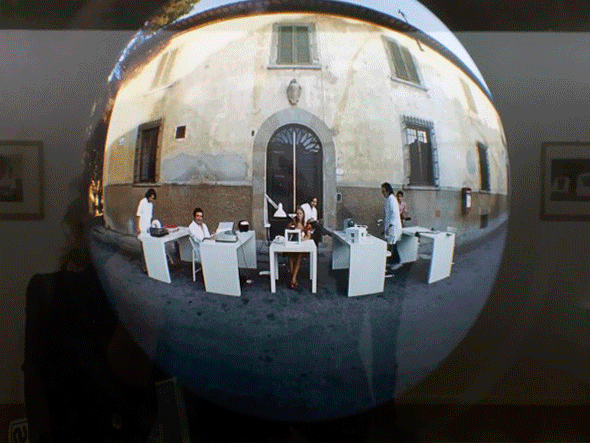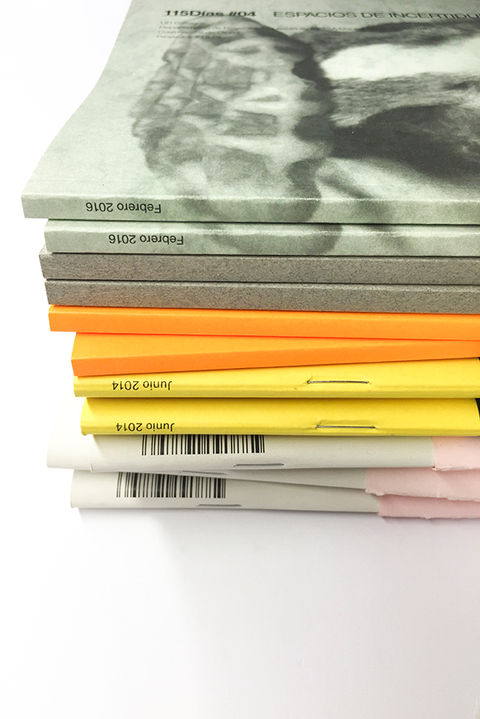PhD Dissertation

The Radical Choice. A Journey through Superstudio
Marcos Parga
PhD, Doctoral Thesis, Summa Cum Laude. November 19, 2015.
Department of Architectural Projects E.T.S.A. MADRID Polytechnic University (UPM)
For a full reading (Digital UPM Archive) click here
Between 1966 and 1967 a small group of newly graduated architects from the Faculty of Architecture in Florence staged in two events the Superarchitettura exhibition. Held in the cities of Pistoia and Modena, with this rebelious yet intentional gesture, they unwittingly inaugurated a short but intense period of architectural experimentation that will convulse Italy during the following 10 years. Blown up by a multitude of proposals, this alternative movement will result in the latest architecture with socio-political aspirations responsible for a vibrant theoretical legacy that proclaimed a return to forgotten roots of the profession and that was more concerned with reflect on its fundamentals than perpetuate the practice of a profession now put into crisis.
Both events also involve the simultaneous birth of Superstudio and Archizoom, two of the most influential groups of Italian experimental architecture of these years, turned into protagonists of an hectic period of transition in which a generation was giving way to the next through replacing the received doctrinal principles of modernity by a juicy demystifying uncertainty linked to a new reality – economic, political and social – that would mark the beginning of postmodernism.
The Italian experience arises taking advantage of the commotion of a phenomenon that later some critics labeled as Radical Architecture with the intention of unifying the work of a diverse and fragmented group of architects – mainly European – individually committed to the total rethinking of the definition and objectives of the discipline, while participating in a particular existential crusade with which they sought to, if not change the world, at least break out of the sterile dynamic of professional and technological architecture inherited.
This doctoral thesis promotes an interested recovery of in this short radical time as an ambitious modernization project unfinished, but not only to analyze the causes of its precipitous end, but above all to show the reasons for it’s international success, turning the work of Superstudio, a paradigmatic example of the critical attitude shared by the rest of contemporary operators, into the suitable catalyst from which to interpret and extrapolate it’s legacy in order to recount the significant change that this episode marked for architectural practice, moving it away from building and focusing it on the adoption and implementation of many non-tectonic activities in an attempt to separate from what was perceived as a corrupt discipline.
Throughout their short career in common, the six members of Superstudio replaced conventional construction by intensive exploitation of alternative means – from furniture and lighting design and some experiments around the “electric architecture”, to the media expansion of their work through magazines, films, exhibitions and lectures – thus contributing to a provocative destruction and subsequent expansion of the limits within which architecture had remained ensconced until then.
This dissertation finds out the importance of considering what occupied much of the activity of Superstudio and their radical colleagues (furniture, magazines, installations, films, theoretical and educational work, etc.) as new forms of architecture that build a new critical language, in an attempt to help renew and reinforce the relevance and social responsibility of a profession call to expand beyond the built to nourish and interact with all areas of our everyday environment.
Selected Press
115 Días
115 Días is the Madrid Polytechnic University School of Architecture Unit21’s annual compendium of select student work, events, lectures, and exhibitions.
Founded in 2014 by Marcos Parga, he has been Editor in Chief until 2017, when he moved to the US.
Each issue collects all the information generated each semester around a specific topic that, linked to architecture and occupying it a central position, triggers a critical reflection in which interferences / affinities with other disciplines are explored in order to reframe its boundaries, addressing contemporary issues.
115 Días is published twice a year.
115Días #00_UPDATES / January 2014 / Read in ISSUU here. This issue explores the delicate and always controversial world of UPDATES, addressing the unstable dialogue between what exists and its possible regeneration, that territory where the degree of intervention and its nature always end up being the subject of a debate in which the need, reuse, obsolescence, the validity of models, the exalted protectionism, provocation, contextualization or capacity improvement, are recurring themes.
115Días #01_ POP CULTURE / June 2014 / Read in ISSUU here. This issue explores the multifaceted POP phenomenon and its significant consequences, since 60 years ago represented the triumph of consumer choice on the idealism of design, and media power (mass culture) on intellectual elite. Since those turbulent years the theory has not stopped running to catch up with practice …
115Días #02_SHOPPING / January 2015 / Read in ISSUU here. This issue is dedicated to the architecture of CONSUMPTION due to explore the potential of the trivial and ordinary taking a venturian look as an excuse to reflect, at the same time, on the uncharted taboo territory of the commercial building.
115Días #03_ARCH-COUTURE / September 2015 / Read in ISSUU here. In this issue we address the fruitful symbiosis between architecture and fashion, two worlds that have continued to advance provoking each other, and that now we wanted to analyze as a step to make our particular architecture-couture.
115Días #04_AREAS OF UNCERTAINTY / February 2016 / Read in ISSUU here. In this issue we convert into raw material the reality of an uncertain future to try to predict and reflect on the qualities of a possible workspace, using as speculative trigger the nonspecific activity of a start-ups accelerator, whose success is founded precisely in an extreme uncertainty.
115Días #05_VERTICAL DOMAIN / January 2017 / Read in ISSUU here. In this new issue we will question the validity of inherited ideas to start a fertile reflection on possible strategies with which to respond to the challenge of tackling a new (and necessary) vertical urbanism ...
115Días #06_FROM SCRATCH / January 2017 / Read in ISSUU here. In this new issue, in addition to participating in the transcendental debate on the new ways of teaching-learning, we will address a wide range of issues related to it that will help us go beyond the conventional “architecture for children”, replaced by a new challenge: the generation of spatial devices that stimulate self-learning, scenarios capable of facing an uncertain and changing future to become catalysts for change.



















































